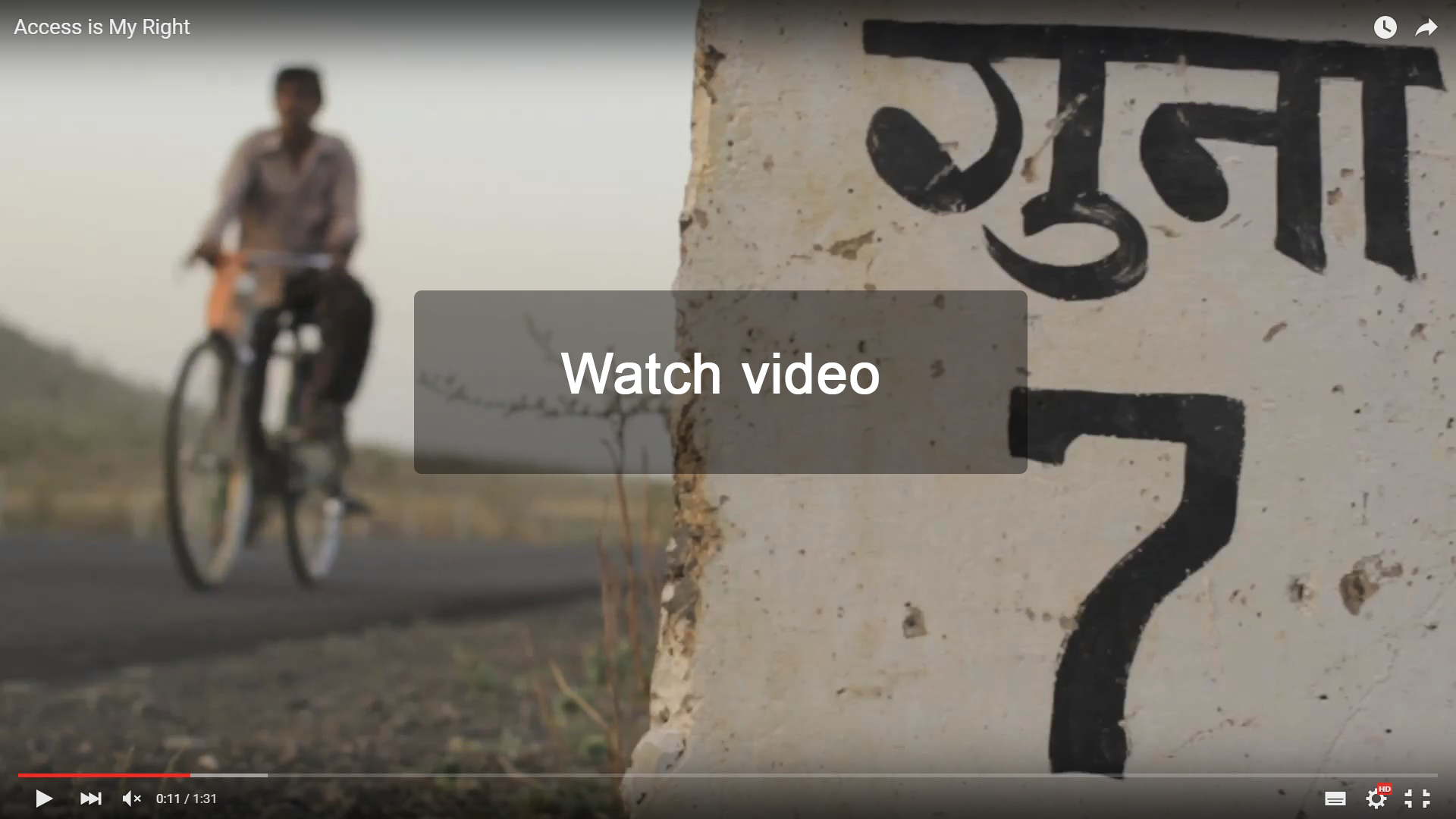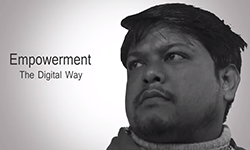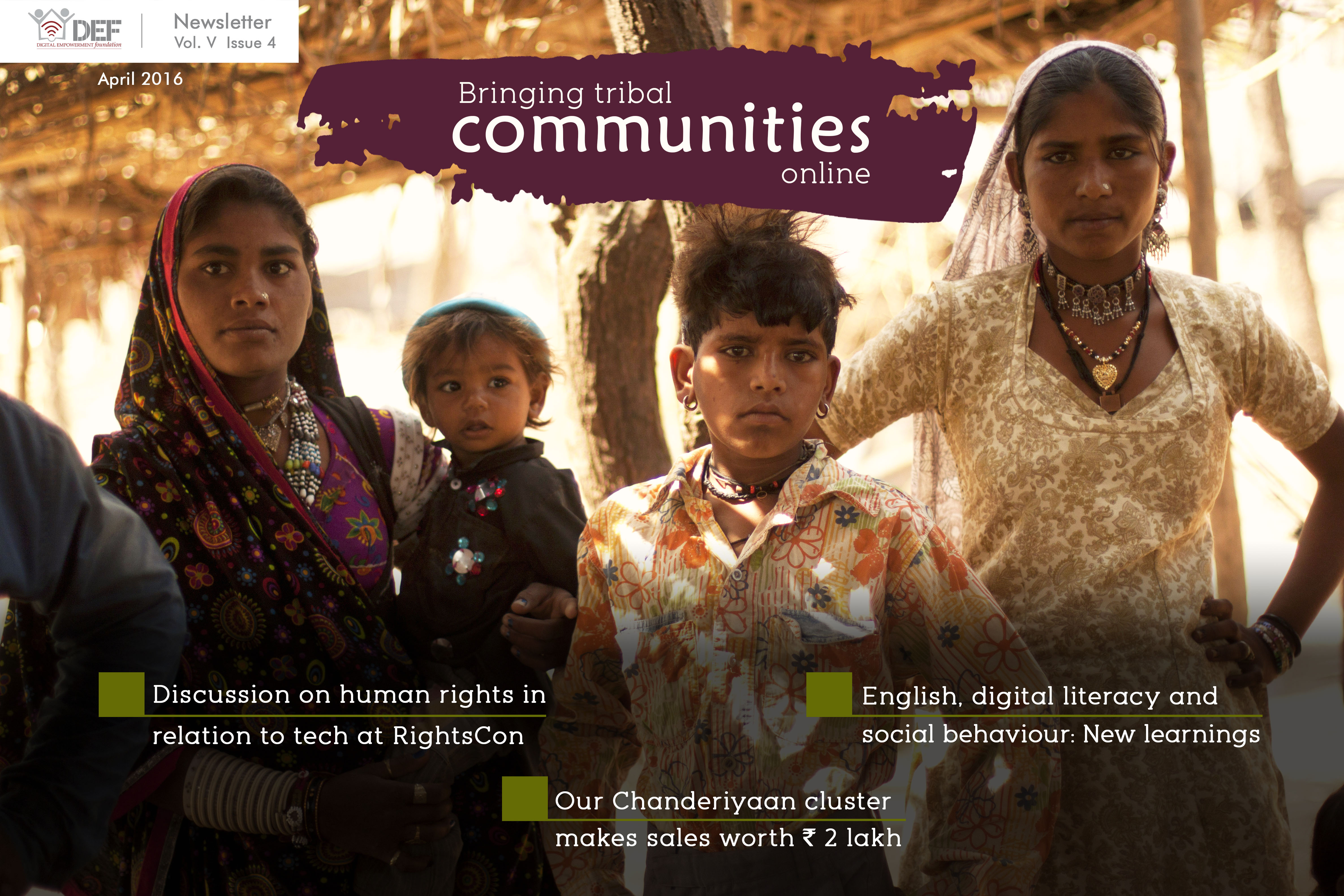
Dear Readers,
India’s tribes, some 7,000 of them, comprise about 10 per cent of the country’s population. More than 95 per cent of them still live in the countryside, which are still dark zones as far as digital access is concerned. The literacy rates among the tribes are low but mortality rates are high. They are also historically prone to exploitation from the relatively stronger non-tribal communities.
Despite the obvious disadvantages of being born in a tribe in India, these communities are culturally oriented towards self-sustenance. Those among them who live in forests often have a robust local economy, so much so that many do not have any use for money, preferring the traditional barter system practiced in the local haats (markets). Many of the tribes people are highly skilled artisans and weavers, but their skills are inadequately utilised and remain locked in the villages, mainly due to a woeful lack of outreach.
One of the primary objectives of Digital Empowerment Foundation (DEF) is to find solutions to these lacunae through digital interventions. In many ways, tribes don’t need help from the outside world. They have their own wisdom that has been acquired over the centuries. In fact, tribal communities have always practiced saving the environment that has become such a huge drive around the world. The modern world has much to learn from them. We at the foundation have always approached tribal communities not just to share our knowledge but to also learn from their traditional wisdom. Culturally women are always more empowered in tribal communities.
They are sometimes the drivers of their community. We therefore focus on the girls and the women. They are quick on the uptake, and through them skills and knowledge flow into the village ecosystem much faster.
The foundation works with a number of tribal communities in Jharkhand, Chhattisgarh, Odisha, Meghalaya, Madhya Pradesh, Rajhasthan and Tamil Nadu. In each of these places, we have seen that tribal communities have adopted technology like a fish takes to water.

Over the years, we’ve realised that tribal cultures and the digital world complement each other. Tribal culture has evolved on the principles of liberty and free speech, just like the Internet. These principles are like oxygen to these worlds, without which they will wither away and die.
In this edition of the newsletter, we’ll share some stories of success that DEF has helped write in tribal zones, and list down the foundation’s plan for tribal communities. You will also get to read, among other things, about the achievements of weavers in Chanderi in Madhya Pradesh, and the determination of our team in Uttar Pradesh and Odisha towards building digitally literate weaver communities.
Vijay Roy, who lives with the Sahariya tribe in Baran district of Rajasthan, was trained in 2008 to establish wireless networks through the Wireless for Communities (W4C) project run by the Digital Empowerment Foundation. Today, the 28-year-old young man looks after seven Community Information Resource Centres (CIRCs) in the state that among many others are helped along by DEF, providing broadband connectivity to remote areas and villages that are still unconnected by a paved road. The CIRCs have also proved to be the catalyst to make 2,000 Sahariyas digitally literate.
Rajkumari is known as Lady Wi-Fi in her neighbourhood because of her enthusiasm in providing broadband connectivity in Baran. Born a Sahariya, who are among the most vulnerable tribes of the country, Rajkumari had studied till Class X but had never seen a computer until she joined DEF’s W4C programme in her district. Today, she teaches children computers and science, besides editing a local tribal newspaper called Khoj Khabar.
Eighteen-year-old Reena Sahariya of Rajasthan wrote her Class XII examinations in 2009. After joining a W4C digital literacy course in 2011, she acquired the skills needed to run the CIRC’s digital literacy programme at Mamoni village, and today teaches children computers. She now wants to wants to learn Photoshop to broaden her career opportunities in photography and design. Read More
Knowledge Hub & Database
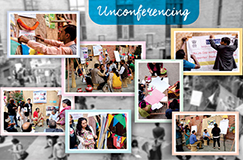
This year, nominations from Bangladesh for the Manthan Awards South Asia will only be accepted through Bangladesh Digital Innovation Manthan Awards (BDIMA). The first edition of BMDIA is an endeavour to help bring the best information communication technology (ICT) innovators in Bangladesh under an umbrella, facilitate greater interaction among them and make BMDIA a forum where all Bangladesi innovators can converge. If your e-initiative has helped bridge the digital gap in Bangladesh or given more power to the citizen, then nominate it for Manthan Awards South Asia 2016. Visit http://brac.manthanaward.org/ to submit your entry.
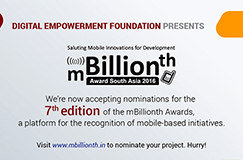
Your wish is our command! The date for accepting applications for the 7th mBillionth Awards South Asia has been extended till April 28, 2016. Let us also take this opportunity to remind you that mBillionth Awards 2016 has adapted new categories and aligned them more with the Sustainable Development Goals in an effort to recognise only the best initiatives. So if you are the brain behind an innovative solution and haven’t submitted your entry yet, visit www.mbillionth.in now to nominate your initiative for the mBillionth Awards 2016. Hurry, take your initiative closer to the recognition it deserves.

Last month, DEF hosted the Social Media for Empowerment Awards 2016 where 19 initiatives were announced Winners and four others were announced Special Mentions. After the event, we decided to interact with each of our winners and ask them several questions to better understand their idea and their initiative. What was the motivation behind the initiative? What challenges did they come across? How do they plan to scale up? And several other such questions were thrown at them to better understand their award-winning ideas. Their answers can be read in a special edition newsletter dedicated to the SM4E winners.
Research & Advocacy
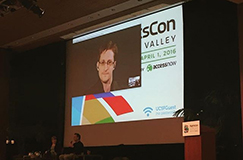
Ritu Srivastava from our Research & Advocacy wing represented DEF as a speaker at Rightscon 2016 in San Francisco from March 30 – April 1. The conference brought together business leaders, visionaries, technologists, legal experts, civil society members, activists, and government representatives on issues lying at the intersection of technology and human rights. Former contractor for the National Security Agency Edward Snowden was also electronically present at the event while Ritu was on the panel for two sessions:Big Brother and its Corporate Brother and Zero-Rating: Access for All Or Curbing Freedom of Expression?
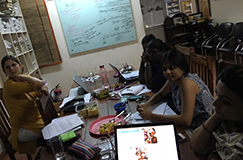
As part of DEF’s continuing efforts to engage in conversation around technology and human rights, and to ensure effective advocacy at the United Nations, we organised a meeting of interested civil society organisations at our offices on April 8, 2016, towards creating a joint statement for the Universal Periodic Review; a mechanism of the United Nations Human Rights Council. The representatives came from varied backgrounds; looking at urban housing, maternal health, LGBT rights and women’s rights, among others, with an aim to gather varied points of view on the issues surrounding human rights in the digital space.
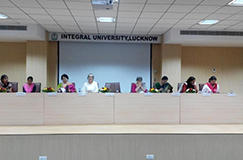
A two-day Conference on Business and Public Policy with a special focus on Uttar Pradesh was organised at the Integral University in Lucknow on March 18-19, 2016. The organising partners of the conference were Æquitas Consulting, DEF, E&H Foundation, Fifth Estate, Wadhwani Foundation and OMC Power. Participants from various background — economists, academicians, civil society member and government representatives, among others — were part of the esteemed panel which discussed at length the role that technology plays, and can further play, in bridging gaps. A detailed report of the conference can be read here.
Enterprise & Markets
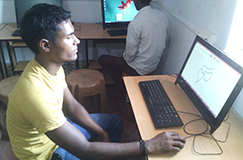
Sabhyasachhi Patra, a VII passed student from Abhirampur village in Nuapatna, Odisha, was struggling to complete his education due to the family’s poor financial condition. His father is a landless weaver, and the entire family, including Sabhyasachhi, depends on handloom silk weaving for a source of livelihood. The financial condition and pressure from his family to contribute to the household income had forced him to drop out of school and start working as a full-time weaver. Today, he earns Rs. 4,000 per month, working under a local master weaver. However, it’s designing that interests Sabhyasachhi more than weaving. Read more
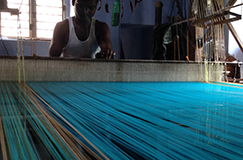
Weavers in Musiri hail from low-income families and mostly weave sarees or dhoti. Almost every weaving household, barring three, weave on handloom. Like most weaving clusters, here too, the occupation is a family tradition where the art of weaving has been passed down the generations. In fact, children start weaving as early as at the age of 10. Women in the house spend about four hours separating and spinning the thread while men work on the loom for about eight hours a day, producing a simple saree or set of six to nine dhotis in two days. Read more

Internet is paving the way forward for prosperity in Chanderi, Madhya Pradesh. In a short period of two years, weavers in the heritage town have made incredible online business and touched Rs. 20 lakh sales figure by selling handloom sarees, suits and duppatas across 20 countries. This feat recently even made it to the front page of Ashoknagar Bhaskar. In 2014, DEF designed an online portal called Chanderiyaan for weavers who were operating from the Raja-Rani Mahal in Chanderi under its Digital Cluster Development Programme. This technology provided a direct, interactive platform between weavers and end consumers. Read more
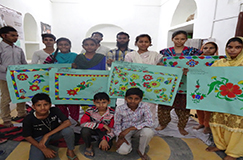
As many as 110 students are now taking digital literacy classes being run by DEF, in partnership with Ericsson India, in Saidanpur village of Barabanki district, Uttar Pradesh. Additionally, 10 young men from the village were selected to help our Wireless for Communities team set up a wireless Internet network with eight access nodes. These nodes have connected about 25 places including three government schools, one PHC, three anganwadis, four private schools, three madarsas, three colleges and a nearby village. A design competition was also organised to help identify the first batch of students for digital design classes.
Access & Infrastructure
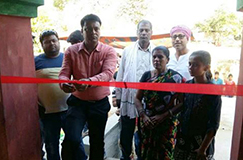
The local community of Asthua village in Darbhanga, Bihar, can now enjoy benefits of computer literacy and digital services as a new CIRC has been inaugurated in their village. On March 22, 2016, a CIRC was inaugurated in Asthua by Block Development Officer Dr. Shashi Prakash, DEF Founder-Director Osama Manzar and Sarpanch Babulal Yadav. Community members from all age groups gathered in large numbers for the inauguration as Dr Prakash expressed appreciation for the proposed activities under CIRC. The villagers were informed in depth about the benefits that CIRC will provide towards leading a holistic development.
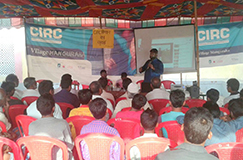
On April 5, 2016, a farmers’ conference-cum-workshop was organised at CIRC Manguraha in Ramnagar block of East Champaran district in Bihar. CIRC regional coordinator Saeed Siddiqui explained to the participants the efforts the government is making towards bringing farmers in the country online so that the latter can access the latest information about agriculture, sericulture, horticulture and even cattle rearing. Block Agricultural Advisor Ajay Kumar spoke at length about the various government schemes introduced exclusively for the farming community, and guided them through the process of registering on farmer portals.

The pilot phase of British Council’s EDGE course, implemented in collaboration with DEF, has now come to an end. To assess the learning of students, an end-course test was held at CIRCs in Kapashera and Wazirabad in Delhi, and Chandauli and Mungaska in Alwar district of Rajasthan. The test was supervised by representatives from the CIRC headquarters in Delhi and the British Council, respectively, who observed that young girls — who couldn’t even speak a few words in English earlier — were now reciting poems, feeling less hesitant in operating digital tools, and looking more confident as individuals.
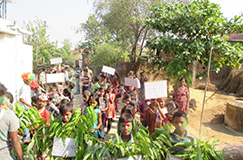
On the occasion of Holi, the staff of dCIRC Wadsa in Gadchiroli district of Maharashtra conducted an awareness programme, followed by a street play, for children and youth in a neighbouring village called Potgaon. The programme aimed to generate awareness among youngsters about social evils like addiction, dowry and lack of girl child education. The participants were spoken to about the importance of education and basic digital skills in today’s age, and motivated to enroll for DEF’s digital literacy classes. dCIRCs or Digital Community Information Resource Centres are run by DEF in partnership with Vodafone Foundation.
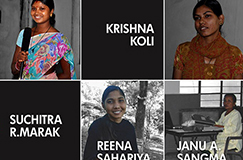
Wireless Women for Entrepreneurship & Empowerment (W2E2) is a programme implemented by DEF in partnership with the Internet Society (ISOC) to create women’s micro-level social enterprises. Under the project, 10 young women were selected in Baran, Chanderi, Tura, Ranchi and Shivpuri each. They were given a laptop, a printer-scanner, a camera, a mobile phone and wireless Internet connectivity; and were asked to use the same to set up small business establishments. While some established a digital services centre, somebody else turned into a travel agent while another opened a digital literacy centre. Read their stories here.
Governance & Entitlements
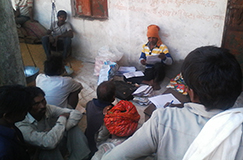
One day Soochna Sevak Padam Bheel in Meriyakhedi Khurd, Madhya Pradesh, was approached by some villagers who came up to him and said, “Sir, the ration dealer will probably not distribute ration to us this time.” Surprised, Bheel enquired “But why, what happened?” As per the new rules, the ration dealer had refused to distribute ration in the absence of all essential documents such as ration card verification receipt, Aadhaar card, voter ID or bank passbook, among others. However, some villagers didn’t have ration card, some didn’t have the Aadhaar card and somebody else had lost his passbook.Read more
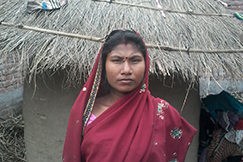
Balkishan Khawaas, Baldani Devi’s husband who hailed from Bihar, was forced to migrate to Punjab in search of better employment and financial security. In the absence of any bank account, every time he had to travel back home, he would to carry all his hard earned cash with him. A couple of times, he was robbed in course of the journey. Then, Soochna Seva Kendra informed him about the existence of Pradhan Mantri Jan Dhan Yojana (PMJDY), a National Mission on Financial Inclusion programme towards comprehensive financial inclusion of all households in the country.Read more
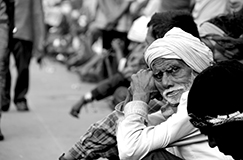
Soochna Seva, a DEF & European Union project, has been successfully working for the last two years towards serving the marginalised and underserved communities in making them aware of their rights and entitlements with regards to public schemes. In the last two years, Soochna Seva teams have campaigned in more than a hundred villages. As many as 48,586 people were registered in 2015 alone; out of these, 40,820 received benefits under schemes related to education, health, social security, financial inclusion, livelihood & employment, and institutional schemes.
Social Sector & CSO
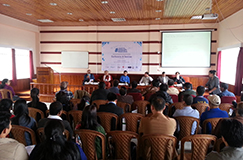
DEF and Synergy, a Sikkim-based NGO which aims at promoting partnership between various groups, organised a one-day seminar for non-government organisations, self-help groups and entrepreneurs in Gangtok on April 2, 2016. During the workshop, the participants were enlightened about opportunities on e-Commerce, social media, crowdfunding and CSR. Following the welcome address by Meghna Thapa of Centre for Environment Education, the session began with a discussion on the challenges being faced by NGOs today. NGOs were also told how the .ngo domain can add credible and validity to their names. Read more
Travel Log
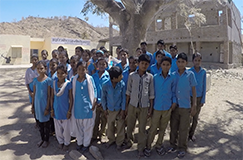
When the President of the United States of America, Barrack Obama, had met the woman sarpanch of Nichlagarh, Sharmi Bai, during his India tour in 2015, Nichlagarh still existed in the dark age of connectivity. Illiteracy level was at 70 per cent and digital illiteracy at 100 per cent. Today, Nichlagarh in the state of Rajasthan has become a beacon of digital inclusion in the country. And we were there to document their amazing story of digital inclusion this month. Nichlagarh, home to Garasiya tribe, is a Wi-Fi-enabled tribal village — a status it gained in a matter of past few months. Read more
Cyber Champ of the Month
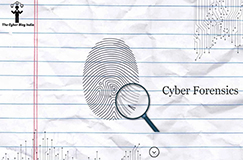
The idea behind Cyber Blog India is that only awareness is the key to safety: No high tech gadget can safeguard an organisation or its people from security vulnerabilities if users are unaware. And the reason behind this idea is the concern that cybercrime needs to be addressed because the frequency of attacks has increased exponentially in India over the last few years. And given the Digital India drive and digital inclusion increase, the number of aware users has only been decreasing. Undeterred by the financial challenges, Cyber Blog India is run by a group of law students. Read more
e-NGO of the month
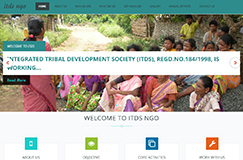
Integrated Tribal Development Society (ITDS) is a non-governmental organisation that runs from the West Godavari district in Andhra Pradesh. The organisation’s efforts concern the overall welfare and well-being of the tribal poor in the West Godavari and East Godavari districts. ITDS has taken up several initiatives in Andhra Pradesh that have benefitted the families displaced in Polavaram by implementing resettlement and rehabilitation projects in the areas of education, health, food, employment, clothing, care and love. The NGO has also been vocal against the displacement of over 1.6 lakh tribals in the area.
Scheme of the Month
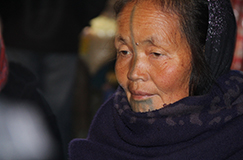
Among Scheduled Tribes, there are certain tribal communities who have declining or stagnant population, low literacy, pre-agricultural technology and are economically backward. A total of 75 such groups have been identified as Primitive Tribal Groups (PTGs). Since PTGs constitute the most vulnerable section among tribals and inhabit isolated, remote and difficult areas in small and scattered hamlets/habitats, the Development of PTG scheme aims at planning their socio-economic development in a holistic manner by adopting habitat development approach and intervening in all spheres of their social and economic life. Read more about the scheme here.
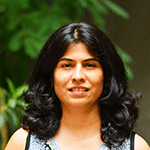
Nonika Raj Kumar, Head CSR & Sustainability,
Canara HSBC Oriental Bank of Commerce Life Insurance Company
Social media has had a tremendous impact on all aspects of our lives — be it the way we communicate, we teach and learn, or we do business — well almost every aspect of our lives.
The evolution of social networking platforms in the last few years has been truly remarkable, especially when keeping in mind the astronomical rate at which our society and culture are changing. Social media networks have emerged as the most popular haunts on the Internet... Read more
Data & Analysis
To stay updated with DEF Founder-Director's columns, featured this past month in Mint newspaper, click here
To follow DEF's coverage in media, click here
Click here to read interesting facts and figures from the digital world, published in collaboration with Mint newspaper on a designated page called 'Digital Edge'.
About Us
House No. 44, 3rd Floor Kalu Sarai, (Near IIT Flyover),
New Delhi – 110016
Subscribe to our mailing list
Email : def@defindia.net | URL : www.defindia.org
Tel: +91-11-26532786 | Fax: +91-11-26532787
